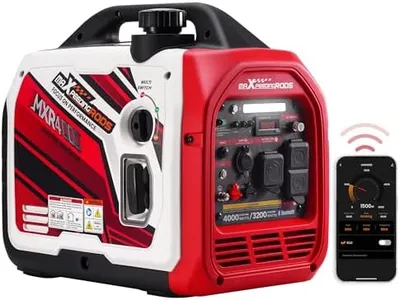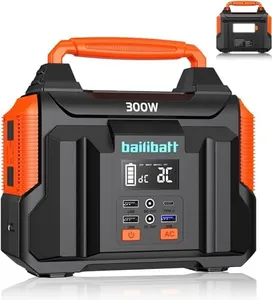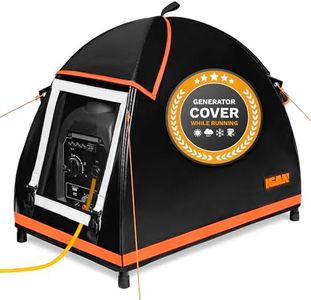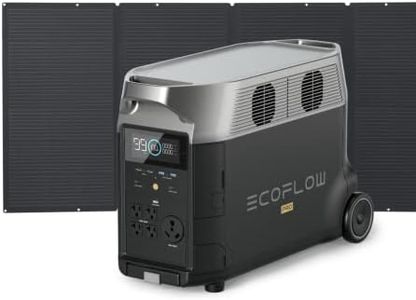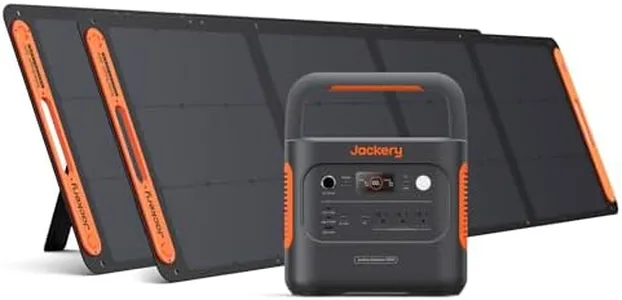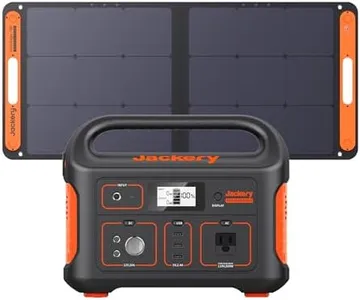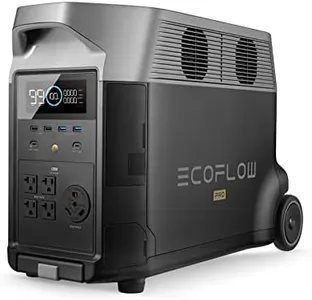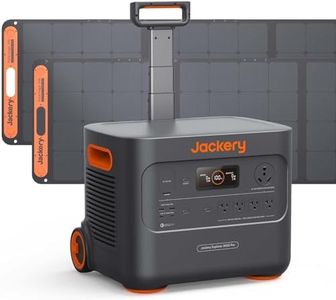10 Best Portable Solar Generators 2025 in the United States
Our technology thoroughly searches through the online shopping world, reviewing hundreds of sites. We then process and analyze this information, updating in real-time to bring you the latest top-rated products. This way, you always get the best and most current options available.

Our Top Picks
Winner
EF ECOFLOW Solar Generator DELTA2 with 220W Solar Panel, LFP(LiFePO4) Battery, Fast Charging, Portable Power Station for Home Backup Power, Camping & RVs
Most important from
2963 reviews
The EF ECOFLOW Solar Generator DELTA2 is an impressive option for those seeking a portable solar generator, particularly for camping, RVing, or as a backup power source at home. Its strengths lie in its high battery capacity, durability, and versatility in powering various appliances. With an output of 1800W and the ability to expand capacity up to 3kWh, it can handle a wide range of devices, making it suitable for both casual outdoor use and emergencies. The included 220W bifacial solar panel is a significant plus, allowing for efficient solar charging and better energy capture.
However, the DELTA2 comes with some drawbacks. Weighing in at 58 pounds, it may not be the most portable option for everyone, especially if you're trekking or need to carry it over long distances. While its charging time is impressive, utilizing solar charging can still take several hours, which might not be ideal during urgent situations. Additionally, the cost of the unit may be higher compared to simpler, less powerful solar generators, which could make it less appealing for budget-conscious consumers.
The EF ECOFLOW DELTA2 stands out for its robust battery life and high output capabilities. It’s suitable for users who need reliable power on the go or at home, but potential buyers should consider its weight and price in relation to their specific needs.
Most important from
2963 reviews
Jackery Explorer 1000 v2 Portable Power Station,1070Wh LiFePO4 Battery,1500W AC/100W USB-C Output, 1 Hr Fast Charge, Solar Generator for Camping,Emergency, RV, Off-Grid Living(Solar Panel Optional)
Most important from
1582 reviews
The Jackery Explorer 1000 v2 Portable Power Station is a robust and versatile solar generator that packs a punch with its 1,070Wh LiFePO4 battery and 1,500W AC output. It can easily power multiple devices, making it ideal for camping, road trips, emergencies, or off-grid living. One of its standout features is the rapid one-hour full charge, although this requires activating an emergency charging mode via the Jackery App. Normally, it takes about 1.7 hours to fully charge, which is still quite fast compared to competitors.
Its lightweight design (23.8 lbs) and foldable handle contribute to its portability, though it might still feel a bit heavy for some users on extended trips. The power station also boasts a long lifespan, maintaining over 70% capacity after 4,000 charge cycles, equating to around 10 years of use. It comes with multiple output ports, including USB-C, USB-A, a DC car port, and three AC ports, allowing you to charge several devices simultaneously.
The inclusion of smart app control for managing different charging modes adds to its convenience. However, the optional solar panel is not included, which could be a downside for those looking for an all-in-one solution. Durability seems excellent, thanks to the LFP battery and overall build quality. This power station is best suited for users who need reliable, high-capacity power on the go and are willing to manage its advanced features via the app.
Most important from
1582 reviews
EF ECOFLOW Solar Generator DELTA 2 Max 2048Wh With 400W Solar Panel, LFP Battery Portable Power Station Up to 3400W AC Output Fast Charging 0-80% in 43 Min solar powered generator For Camping, RV
Most important from
1156 reviews
The EF ECOFLOW Solar Generator DELTA 2 Max is a robust and versatile portable power solution, ideal for camping, RV trips, and even home power outages. Its battery capacity of 2048Wh and powerful 400W solar panel make it a strong contender in its category. The fast charging capabilities are impressive, allowing it to reach 80% charge in just 43 minutes using both solar and AC inputs, or in 1.1 hours with AC only. This makes it highly efficient for quick power-ups in various situations.
The inclusion of multiple output ports (15 outlets) means you can power almost any household device, and with the X-Boost mode, it can handle high-wattage appliances up to 3400W, adding to its versatility. The upgraded LFP battery offers a long lifespan with over 3000 charging cycles, which is significantly above industry averages, ensuring durability and cost-efficiency. The lightweight, waterproof solar panels are built to withstand outdoor conditions and are easily portable at 35.3 pounds.
However, the weight of the generator (86 pounds) may make it less convenient for frequent transportation. The smart app control adds convenience by allowing you to customize charging times and monitor the battery status, though it may require some initial setup and learning to use effectively. In terms of durability and build quality, the DELTA 2 Max is designed to endure rugged outdoor use, but its high price point might be a consideration for budget-conscious buyers. This portable solar generator is perfect for those looking for a reliable, fast-charging, and high-capacity power solution for both outdoor activities and emergency home use.
Most important from
1156 reviews
Buying Guide for the Best Portable Solar Generators
Portable solar generators are a great way to ensure you have power on the go, whether you're camping, traveling, or preparing for emergencies. They harness energy from the sun and store it in a battery, providing a renewable and eco-friendly power source. When choosing a portable solar generator, it's important to consider several key specifications to ensure you select the best fit for your needs.FAQ
Most Popular Categories Right Now
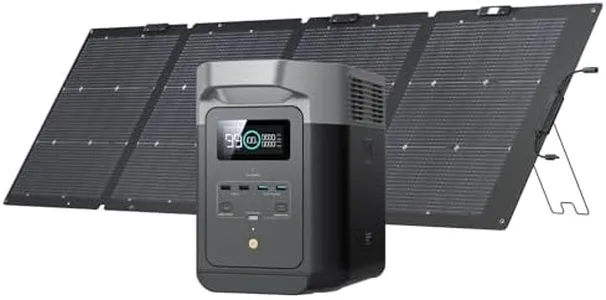
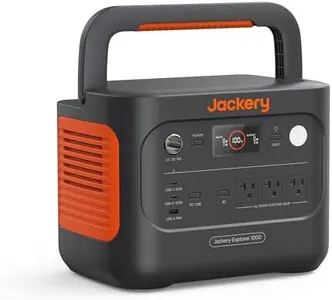
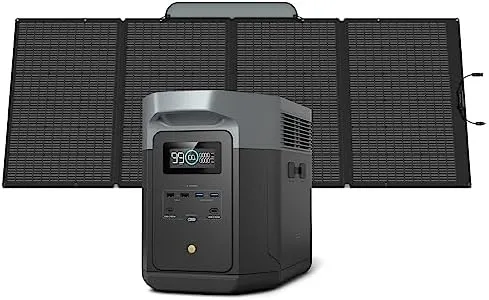
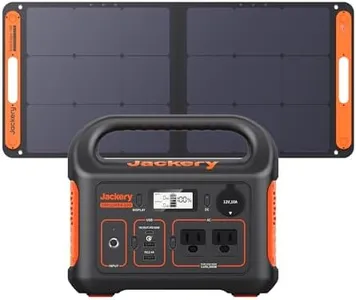
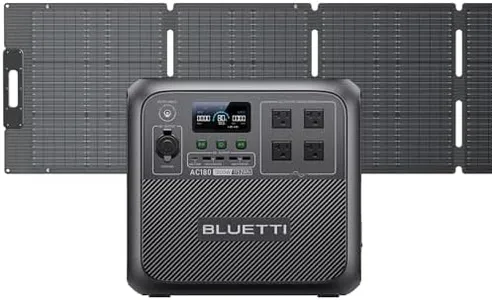
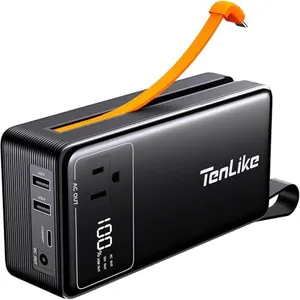
![[Upgraded Version] ALLPOWERS S2000 Portable Power Station 2000W (Peak 4000W) MPPT Solar Generator 1500Wh Backup Battery with 4 AC Outlets for Outdoor Camping RV Emergency Off-Grid](https://images-proxy.bestreviews.guide/OouIKpk4unEf0t5j_R8qV3SP1_g=/0x300/https://m.media-amazon.com/images/I/51n9OTptdIL._AC_CX679_.jpg)
